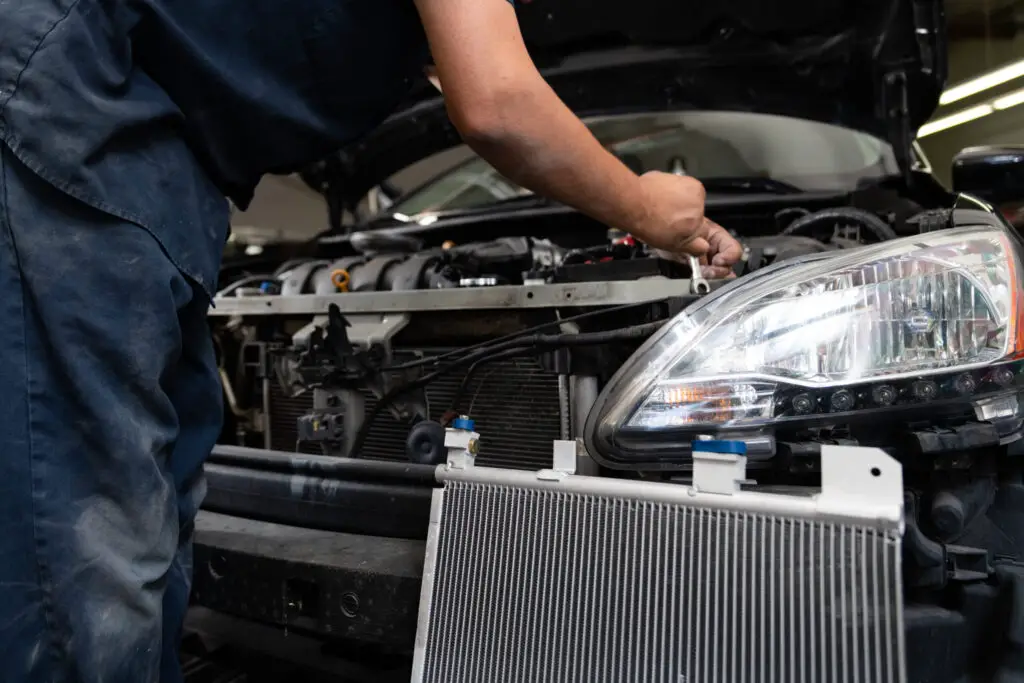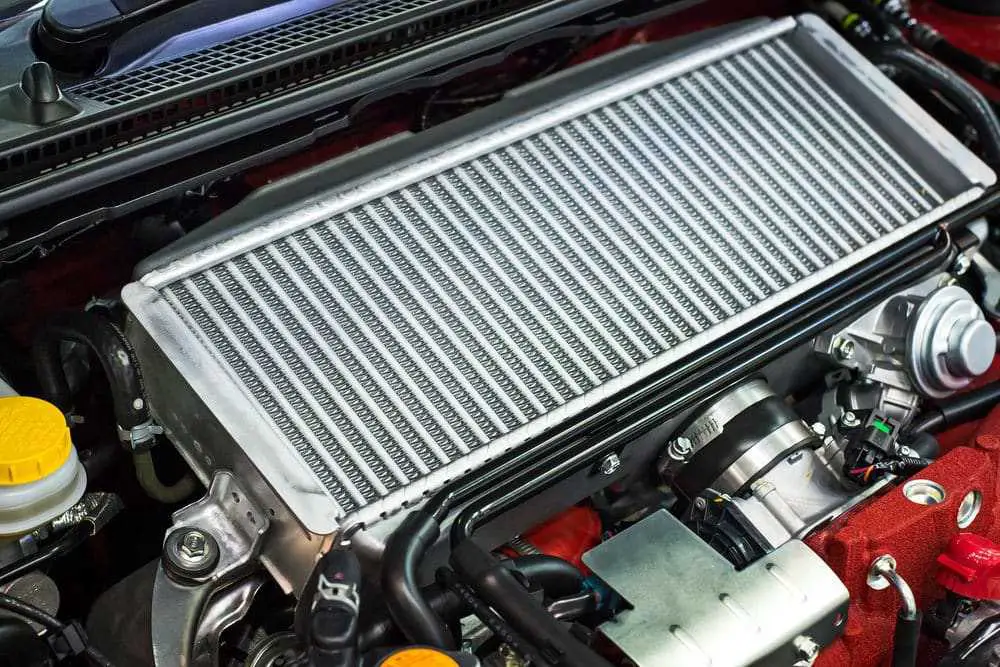A radiator fan that won’t turn off is often due to a faulty temperature sensor, stuck fan relay, or wiring issues. Overheating or ECM malfunctions can also cause this problem.
The radiator is a crucial part of your car’s cooling system, responsible for maintaining optimal engine temperatures. It plays an essential role by dissipating heat generated during engine operation. However, if your car’s radiator fan won’t turn off, this can signal an underlying issue that, if not addressed promptly, could cause wear on the system, reduce performance, or even lead to more serious damage.
In this detailed blog post, we’ll cover everything you need to know about why your car radiator fan might keep running, how to diagnose it, and what can be done to fix and prevent it.

Contents
Role of Radiator Fan
The radiator fan is primarily responsible for pulling air through the radiator to keep the engine cool. This helps dissipate the heat collected from the engine coolant, preventing the engine from overheating.
Most modern vehicles use electric fans that are controlled by sensors monitoring engine temperature and coolant levels. When the temperature rises above a certain threshold, the fan is activated to cool the radiator. It automatically turns off once the engine has cooled to the desired temperature.
Causes of Car Radiator Won’t Turn Off
Several factors can lead to your radiator fan continuing to run, even after the engine is turned off or cooled down. Here are the most common culprits:
1. Faulty Temperature Sensor
The coolant temperature sensor (CTS) is responsible for measuring the temperature of the engine’s coolant and relaying this information to the car’s ECU (Engine Control Unit). When the CTS is malfunctioning, it may send inaccurate readings, causing the fan to run longer than necessary.
A stuck or broken CTS may continually send a signal that the engine is too hot, even when it has already cooled down. This keeps the fan engaged when it should be turned off.
How to Fix:
- Have the CTS tested by a mechanic to determine if it’s malfunctioning.
- If the sensor is faulty, it will need to be replaced.
2. Damaged Fan Relay
The radiator fan relay acts as a switch that turns the fan on and off. When this relay becomes damaged or stuck in the closed position, the fan could continue to run indefinitely. This is a fairly common issue, especially in older vehicles.
How to Fix:
- Inspect the fan relay for signs of wear, corrosion, or electrical issues.
- If the relay is stuck or not functioning correctly, radiator fan relay replacement is often the solution.
3. Wiring Issues
A short circuit or damaged wiring in the fan’s electrical system could cause the radiator fan to keep running. In some cases, wires may be corroded, frayed, or disconnected, leading to continuous electrical signals being sent to the fan.
How to Fix:
- Inspect the wiring that connects the fan to the vehicle’s electrical system.
- Repair or replace any damaged wiring.
- Make sure all connections are clean, secure, and free of corrosion.
4. Stuck Fan Switch
Many vehicles are equipped with a manual or automatic fan switch. If this switch becomes stuck or malfunctions, it may cause the fan to continue running even when it’s not needed.
How to Fix:
- Check the fan switch for signs of damage or wear.
- Replace the fan switch if it’s malfunctioning.
5. Faulty Engine Control Module (ECM)
The ECM, also known as the ECU, is responsible for controlling many of the car’s systems, including the radiator fan. A glitch or engine control module problem could result in it not properly regulating when the fan turns on and off. While this is a rarer issue, it can happen.
How to Fix:
- Have a mechanic or dealership scan your car’s computer for error codes.
- If a faulty ECM is detected, it may need to be reprogrammed or replaced.
6. Thermostat Issues
If the car’s thermostat is stuck in the open position, the engine may not reach its optimal operating temperature, causing the fan to stay on longer than it should. In this scenario, the engine is sending signals that it’s still too hot, keeping the fan running to cool down the radiator.
How to Fix:
- Test the thermostat for proper functioning.
- If it’s malfunctioning, radiator thermostat replacement can solve the issue.
7. Overheating Problems
If the engine is genuinely overheating, the radiator fan will run continuously to try to bring the temperature down. This could be due to low coolant levels, a coolant leak, a failing water pump, or other mechanical issues.
How to Fix:
- Check coolant levels and top them up if needed.
- Look for visible leaks in the cooling system.
- If the issue persists, consult a mechanic for further diagnosis.

How to Diagnose Car Radiator Won’t Turn Off Issue
When faced with a radiator fan that won’t turn off, you can follow a few simple diagnostic steps to pinpoint the problem:
- Check the Coolant Temperature Sensor (CTS): Use a scan tool to retrieve any diagnostic trouble codes (DTCs) from the ECU. If the CTS is sending incorrect temperature readings, the scan tool should show this.
- Test the Fan Relay: Swap the fan relay with another identical relay from your vehicle’s fuse box to see if the fan turns off. If swapping the relays fixes the problem, the relay is faulty.
- Inspect the Wiring: Visually inspect the fan’s wiring for any visible damage, corrosion, or loose connections.
- Look for Error Codes: Use a diagnostic scanner to check for any error codes from the ECU. This can indicate issues with sensors or the ECM itself.
- Thermostat Check: If your engine isn’t warming up to the correct temperature, this might indicate a stuck thermostat.
How to Prevent Car Radiator Won’t Turn Off Issues
Preventive maintenance is key to avoiding recurring radiator fan issues. Here are some tips to help maintain the health of your cooling system:
- Regularly check coolant levels and ensure that they are within the recommended range.
- Replace the coolant according to your car manufacturer’s schedule to prevent corrosion and clogging.
- Inspect the radiator and hoses for any signs of damage or leaks.
- Clean the radiator fan and ensure that there’s no debris obstructing airflow.
- Test the thermostat periodically to ensure it’s functioning correctly.
- Have your car’s cooling system inspected annually to catch issues early.
Frequently Asked Questions
Here are some FAQs about radiator won’t turn off –
1. Why does my radiator fan keep running after I turn off the engine?
A: The radiator fan may continue running due to a malfunctioning coolant temperature sensor, a stuck fan relay, or overheating issues. Some vehicles also run the fan briefly after shutdown to cool the engine.
2. Can I drive with the radiator fan stuck on?
A: While it’s generally safe to drive with the fan stuck on, it could lead to premature wear of the fan motor and battery drain if left unaddressed.
3. How long should the radiator fan run after turning off the engine?
A: In most cases, the fan should only run for a few minutes after turning off the engine. If it runs continuously for an extended time, there may be a problem with the cooling system.
4. How do I test if my fan relay is bad?
A: You can test the relay by swapping it with a similar relay in your fuse box. If the fan turns off after swapping, the relay is likely the problem.
5. What happens if the engine control module (ECM) is faulty?
A: A faulty ECM may send incorrect signals to the radiator fan, causing it to stay on or malfunction. In this case, you would need a professional to diagnose and possibly reprogram or replace the ECM.
Conclusion
A radiator fan that won’t turn off can stem from a variety of causes, ranging from a simple faulty sensor to more complex electrical issues. While some fixes, like checking coolant levels or swapping relays, can be done by the average car owner, other problems may require a professional mechanic’s attention. Promptly addressing the issue can help prevent more serious damage to your car’s engine.
Always remember to prioritize regular maintenance to keep your car’s cooling system in good shape, ensuring smooth operation and preventing overheating problems. Catching potential issues early can save you from costly repairs down the road.